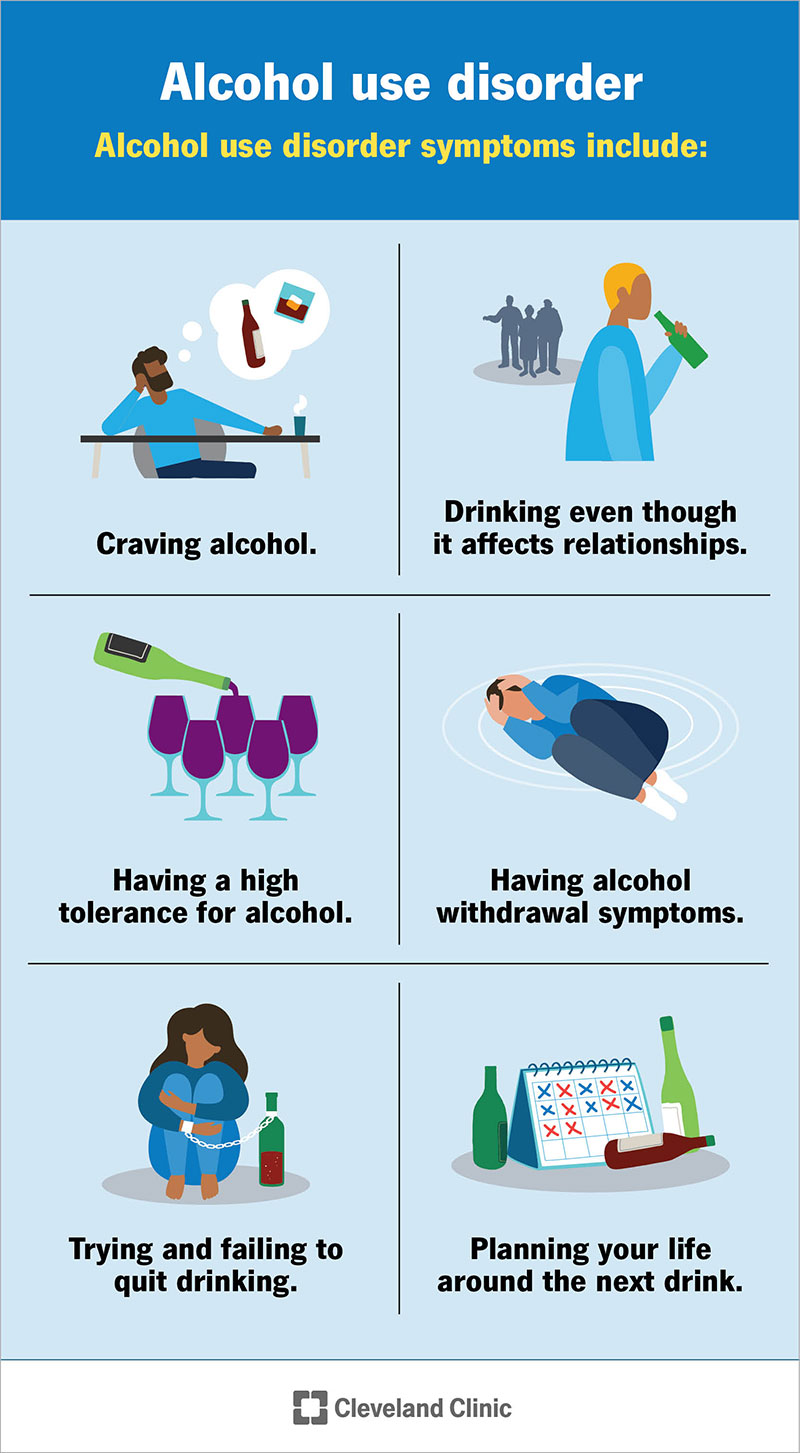Alcohol use disorder (sometimes called alcoholism) is a common medical condition. In this disorder, people can’t stop drinking, even when drinking affects their health, puts their safety at risk and damages their personal relationships. Treatment includes medication and behavioral therapy. Studies show most people can reduce how much they drink or stop drinking entirely.
Advertisement
Cleveland Clinic is a non-profit academic medical center. Advertising on our site helps support our mission. We do not endorse non-Cleveland Clinic products or services. Policy
Video content: This video is available to watch online.
View video online (https://cdnapisec.kaltura.com/p/2207941/sp/220794100/playManifest/entryId/1_hw1wic1n/flavorId/1_5f3sgelj/format/url/protocol/https/a.mp4)
Learn the four signs of alcohol use disorder.
Alcohol use disorder (sometimes called alcoholism) is a common medical condition. People with this condition can’t stop drinking, even if their alcohol use upends their lives and the lives of those around them. Alcohol use disorder can be mild, moderate or severe. Treatments may include medication and behavioral therapy. While people with this condition may start drinking again, studies show that with treatment, most people are able to reduce how much they drink or stop drinking entirely.
Advertisement
Cleveland Clinic is a non-profit academic medical center. Advertising on our site helps support our mission. We do not endorse non-Cleveland Clinic products or services. Policy

Image content: This image is available to view online.
View image online (https://my.clevelandclinic.org/-/scassets/images/org/health/articles/3909-alcoholism)
When you think about medical condition symptoms, you may focus on physical issues like pain, fever or a cough that won’t go away. Alcohol use disorder symptoms focus on changes in your mood and behavior, including:
The American Medical Association recommends a two-drink daily limit for men. Heavy drinking in this population is five or more drinks in one day or 15 or more drinks in a week. Women should limit drinking to one drink a day. Heavy drinking in this population is four or more drinks a day or eight drinks a week.
Advertisement
Researchers don’t know all the reasons why someone develops it, but have identified the following factors:
Hangovers and withdrawal are two issues that affect people with alcohol use disorder. But alcohol is a chemical carcinogen. Heavy, long-term consumption of beverages containing alcohol increases your risk of developing esophageal cancer. Other potential complications are:
Healthcare providers diagnose the condition by doing a physical examination to look for symptoms of conditions that alcohol use disorder may cause.
They’ll use criteria laid out in the Diagnostic and Statistical Manual of Mental Disorders, Fifth Edition (DSM-5), based on the symptoms listed previously. Your provider will determine if you have alcohol use disorder and if your condition is mild, moderate or severe:
Your treatment depends on your situation. If your condition is severe, your healthcare provider may recommend inpatient medical treatment or residential rehabilitation. Other treatments are:
Studies show most people with this condition recover, meaning they reduce how much they drink, or stop drinking altogether. People do relapse. They may start drinking to cope with stressful events like losing a job, going through a divorce, or dealing with a death in their family or a close friend. Talk to your healthcare provider if you’re under stress and think you may be at risk for relapse.
To prevent alcohol use disorder, avoid high-risk drinking:
Advertisement
If you drink more alcohol than that, consider cutting back or quitting. Talk to your healthcare provider about proven strategies.
If you’re receiving care for alcohol use disorder, you’ve already taken an important step toward taking care of yourself. Recovery is a journey that you take one step at a time, one day at a time. Here are some suggestions that may help you along the way:
That depends on your situation. For example, if you’re receiving treatment for a condition related to alcohol use, like cirrhosis of the liver, you should ask your healthcare provider about changes in your body that may be new symptoms. If you’re receiving counseling, ask your provider about handling high-stress situations when you may feel like you need some additional mental health support.
Advertisement
People with severe or moderate alcohol use disorder who suddenly stop drinking could develop delirium tremens (DT). This is a severe form of alcohol withdrawal. It can be life-threatening, causing serious medical issues like seizures and hallucinations that require immediate medical care.
You’ll have many questions as you go through treatment and recovery. Here are some suggestions:
If you think you may have alcohol use disorder, you’re not alone. This condition affects millions of people. Realizing you may have an issue is the first step toward getting better, so don’t hesitate to talk to a healthcare provider. They’ll recommend treatments and resources to help you recover from alcohol use disorder.
Advertisement

Sign up for our Health Essentials emails for expert guidance on nutrition, fitness, sleep, skin care and more.
Learn more about the Health Library and our editorial process.
Cleveland Clinic’s health articles are based on evidence-backed information and review by medical professionals to ensure accuracy, reliability and up-to-date clinical standards.
Cleveland Clinic’s health articles are based on evidence-backed information and review by medical professionals to ensure accuracy, reliability and up-to-date clinical standards.
A substance use disorder can turn your life upside down. Cleveland Clinic has the hope and treatment you need.
